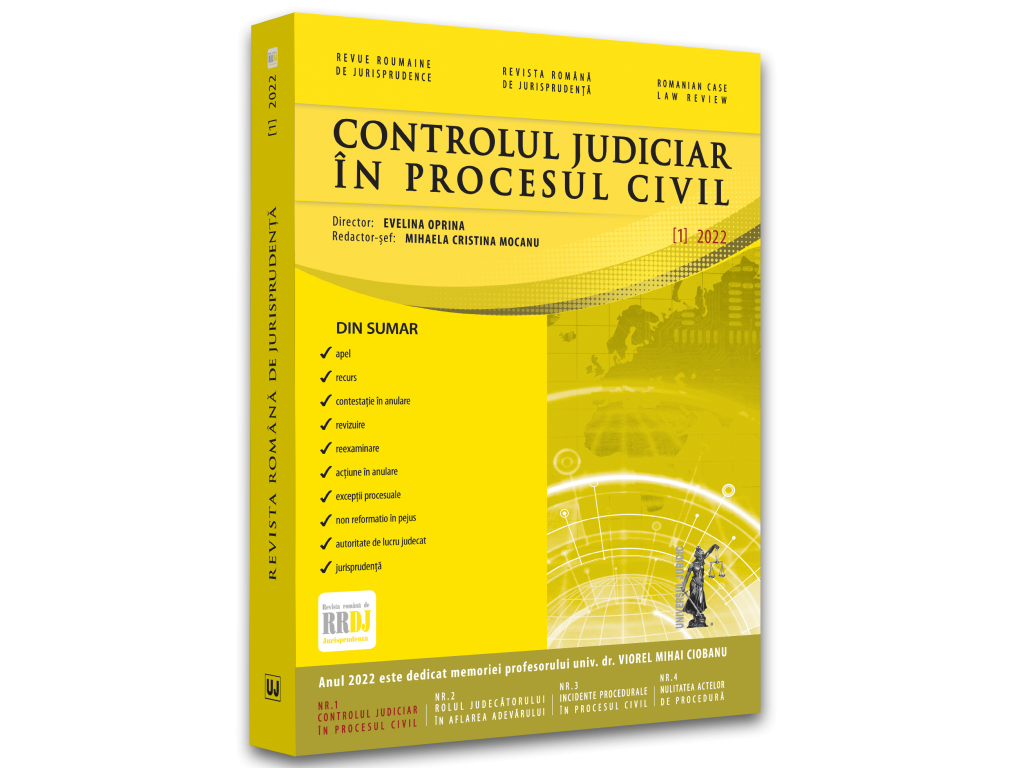Second appeal. Termination of maintenance contract. Waiver of the right does not transform the maintenance obligation into a purely potestative obligation. Effects of res judicata
JURISPRUDENŢĂ COMENTATĂ ŞI ADNOTATĂ
Abstract
The Court of Appeal held, in essence, that the authenticated declaration waiving the right at issue could not have the effect relied on by the appellant, in that it would transform the maintenance contract concluded previously into a contract concluded under a purely potestative condition, which is void, making it impossible for the maintenance creditor to seek termination of the maintenance contract if the maintenance debtor fails to perform his obligation. The waiver of the right in question is a unilateral legal act and produces effects only with regard to the right in the process in which it was waived, so that this unilateral act cannot modify the contract and the obligations of the parties and is not assimilated to an addendum to the contract.
Accordingly, the waiver of the right in dispute does not alter the maintenance contract, nor does it prevent the maintenance creditor from seeking termination of the contract for non-performance of the obligation in the future, but only extinguishes the right to seek termination of the maintenance contract for the reasons stated in the claim in the proceedings in which the right was waived.
In order for a purely potestative condition to be null and void, this condition must be stipulated in the contract between the parties, in this case in the maintenance contract, and must provide that the debtor of the maintenance obligation will perform his obligation only if he so wishes, i.e. subject only to his own will, which the creditor will not be able to censure or criticize in any way, which is also the reason why it is null and void, because in practice the maintenance debtor would not be bound by anything, but only by those acts which he would perform of his own free will.
The maintenance contract and the creditor's authenticated declaration of waiver are two distinct legal acts, the first – a contract (bilateral act) and the second a unilateral act of will, each with a different legal regime, and the possible causes of nullity or modalities of the legal act, such as the purely potestative condition, must be considered individually, in relation to each legal act and its intrinsic content, and it is not possible to create a legal amalgam whereby a valid unilateral act of will, extrinsic to the contract, would render the maintenance contract null and void without it actually containing any invalid clause.
Since this is a maintenance contract which imposes on the maintenance debtor an obligation of successive performance, to be performed continuously by successive instalments until the death of the maintenance creditor, it is obvious that the waiver of the right does not prevent the maintenance creditor from seeking termination for non-performance after the period referred to in the proceedings in which the right was waived or for reasons other than those invoked in those proceedings.
The only issues that can no longer be raised in another lawsuit because the creditor has waived its right are those that were raised in support of the termination claim in the lawsuit in which the right was waived.
It follows, therefore, that the applicant's waiver of the right to be sued in another case had the effect of dismissing the action on the merits, the right in those procedural limits being abandoned by the applicant's valid unilateral will, which prevents the resumption of an identical action in the future because it would prejudice res judicata, more specifically the negative effect of res judicata which prevents the resumption of a new identical action between the same parties or their successors.








